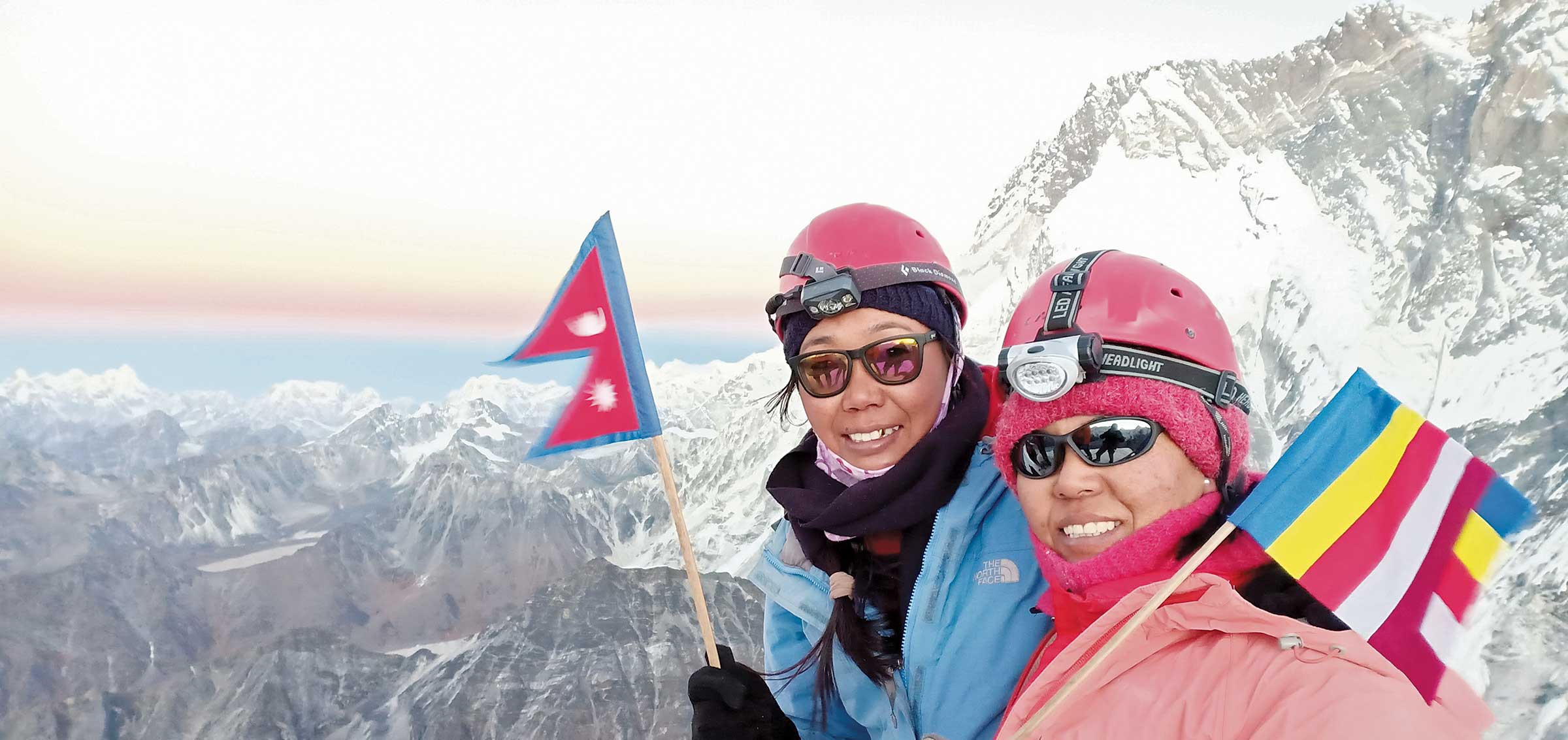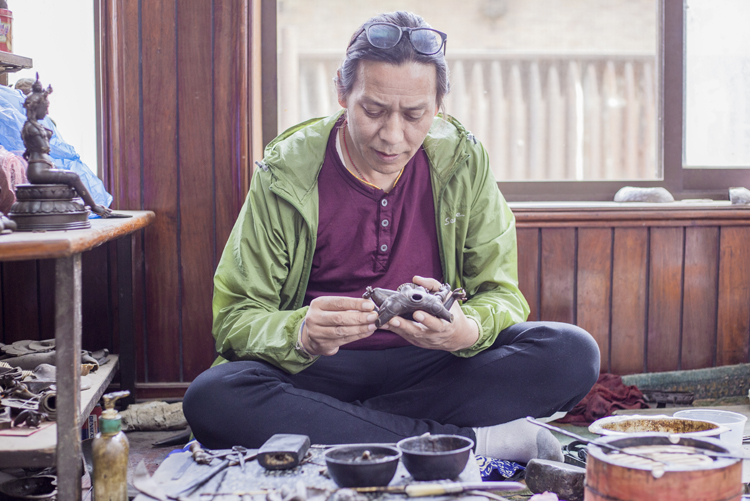
Non- governmental organizations act as scaffoldings in raising countries like Nepal from the lowly status of a developing to developed nation. They are the supporting structures to a country where governments come and go but the conditions at large remain the same. Today, local and international non-governmental organizations (NGOs and INGOs) have come to represent that which is recognized the world over as the need of the age – empowering the people. The three organizations featured here exemplify the achievements and impacts of such organizations in the lives of people in a developing country.
There are the casualties of a war, and there are the survivors of a war. I haven’t lost anyone to a war, but it has always seemed to me that the real victims of war are those who survive it, those who witness it, helplessly; those who live to tell of it, and in telling must relive those moments or ages (surely having someone torn away from you who has been around for years cannot happen in a moment); those who outlive the war, even as war is extinguishing life all around. Those are the real victims of war, for they shall forever have to learn to live life after a war.
The insurgency in Nepal made numerous such victims out of people. And, amongst these victims the young ones are the most vulnerable –to anger, to violence, to crime and all that that make a misery out of peoples’ lives. Revenge! Yes, that is the emotion that must be running in those veins, occupying the minds, and stifling the heart. Most of the youth who were affected by the insurgency in their villages fled to cities like Kathmandu, where it would be better. ‘Better’ is a relative word, but relativity is something a displaced man will overlook.
Nagarik Aawaz
Revenge is a dish best served cold, so they say; but to me it is a dish that should never be on the menu. And, there was no scent of it at the ‘Shanti Bhanccha’ program organized every Thursday by Nagarik Aawaz to feed the people living in the streets. The Shanti Bhancha is conducted by volunteers from the Displaced Youth Volunteer Programme (DYVP), which is an initiative of Nagarik Aawaz (Citizen’s Voice). As the bedraggled and anxious lot from the streets began accumulating in the space in front of the makeshift kitchen, I talked to a few of the volunteers, between their chores of fetching water for the lunch.
The volunteers I met had various reasons for leaving their villages. Most of them fled from fear of being recruited by the Maoists. Prem Bahadur Tamang was fifteen when his father was taken into the forest and shot under suspicion of being an informer. by the army under suspicion that he was a Maoist informer. As he tells me this, he is not looking at me, and I am relieved, for I did not know what to say nor how to say it. I averted my look from him to the dozens of hungry expectants that were now sitting in a big square. I tried to form questions in my head, all the while trying to look drawn to the people sitting. I feared that I had brought up something Prem wanted to forget. So I asked him about his role as a volunteer and how it has helped him. Prem’s voice turned grateful as he told me that feeding hungry people allows him to see life in a clearer way. He said that he now understands that sorrow is all around, and knowing this reduces his own pain.
The expenses for the weekly lunch are met by donations from the local community through voluntary individual contributions. The Shanti Bancha is not just an event for feeding people, it is an occasion for healing.
The Displaced Youth Volunteer Program (or DYVP) is an effort by Nagarik Aawaz to help displaced youth cope with life as displaced individuals. The DYVP has successfully trained 109 graduates thus far. The graduates receive trainings in skill development that will allow them to reintegrate socially. The focus is also on keeping the volunteers away from violence by engaging them in peace building. To keep the emotions of the volunteers channeled positively, monthly interaction programs are held where the volunteers share their experiences with colleagues. Sharing one’s problems with others confronted by similar difficulties creates a way out for the pent-up emotions. These group-sharing sessions are the core of the DYVP for they give the volunteers the opportunity to weigh their sufferings against those of others. And this, as Prem and the other volunteers told me, makes their difficulties less severe.
The DYVP graduates are mobilized in rural areas to work in long term peace building. They work as peace ambassadors in various districts, providing counseling to displaced individuals and families, and by conducting awareness-raising programs in those communities. The DYVP volunteers are provided the opportunity to deliver what they themselves where once deprived of – peace.
Even in the absence of conflict when the nation and society are functioning well, there always are sections that are sidelined. Women and children often must carry the yoke of under-development. The number of NGOs working in the women and children sector affirms these two sections as the ones needing, but not receiving, adequate attention. Discrimination against women often occurs in a place where she dedicates her life to building and protecting – her home. How is a woman supposed to speak against people who constitute the world which she has built so lovingly? It’s not easy, but it is absolutely certain that it is necessary.
Women who are victims of discrimination and violence are faced with an ever-present dilemma. On one hand the traditions and culture forbid resisting their ‘destined’ position and duties, which can be summed up as ‘compliance without complaint’. On the other hand, there is the urge to liberate herself from the mire of a slavish life, especially when all around there are glimmers and hopes of equality. Those who dare break away from this submissive life often find themselves on their own, further increasing a woman’s misery. It is here that organizations such as SAATHI come to the rescue of women whom circumstances have forced to leave the houses they helped make into homes.
SAATHI
SAATHI (which means ‘Friend’) seeks to empower women and children, and also to eliminate all forms of violence and discrimination against them. SAATHI works to make justice more accessible to women and children. It renders a voice to those whose voices are muffled and whose pains are unheard and unheeded. SAATHI’s commitment to helping the victims of violence has brought about the formation of a national network of services for survivors of domestic violence, trafficking, polygamy, rape, and incest – all issues that a woman is unable to tackle on an individual level.
SAATHI runs a women’s shelter in Kathmandu that houses 20 and another one in Nepalgunj that houses 30 at a time. The womens who have been victims of various forms of injustices stay in the shelter for a minimum period of six months during which they receive counseling and, if necessary, legal services. Their stay in the shelter home is also an opportunity to become self-dependent, for which they are given vocational training. Efforts are also initiated to re-integrate the women into their families.
SAATHI is also striving to check the trafficking of Nepalese women and children. It has set up a transit home in Kanchanpur District in the Far-Western Region to facilitate the trafficking recovery process. Here too, the services provided include counseling and vocational training. SAATHI stations trained personnel at border crossings who work in liaison with the security forces in checking human trafficking across borders. SAATHI staff are also aware of the vulnerabilities of women within the country. In 2003, they initiated a program to create a safe working environment for the women working in dance bars and massage parlors of Kathmandu. Drop-in centers in Koteshwor and Kalanki serve as venues for counseling, vocational training, and non-formal education.
Children are the most unfortunate members of a family afflicted by violence. Not only are they deprived of the care that they are entitled to, but witnessing violence in their homes strains their fragile emotional well-being. SAATHI has set up shelter homes for children, and seek to create a congenial environment for them to live in. The Bal Ashraya Shivir ( Shelter for Children). provides shelter for 50 children who have been victims of sexual abuse or domestic violence, and who are poor, and children who have left home due to various reasons. Children between the ages of four and 14 are provided basic education, and their more crucial emotional needs of love and care are also met.
SAATHI also runs a drop-in center that addresses childrens’ more immediate needs, such as clothing, food, recreation, medical treatment, and accommodation. The drop-in center mainly receives street children who often come there to spend the night. It was a welcome change for me, seeing street children playing basketball or reading and not indulging in glue sniffing, rag picking or any of the other activities that one usually finds them doing out on the streets. Counseling is available, and SAATHI also provides scholarships for promising children. The organization is currently financing the education of several children.
Running an NGO requires considerable funds. In Nepal’s context, these funds come from donor agencies. This system of funding local development programs by international agencies has faced criticism from some sections of the citizenry for the dependency it creates. It would be very difficult to find an NGO that does not rely on foreign aid today.
Tewa
Tewa is an organization that has broken the trend of seeking funds from outside the country. Its leadership and staff believe and has proven that funds can be generated within the country.

Tewa (Support) is an organization that promotes philanthropy for the upliftment of women, specially those from rural areas. Tewa’s motto for development is philanthropy for sustainable development. The philosophy of Tewa that funds can be generated on one’s own are testified by the magnificent edifices that make up their office complex in Dhapakhel. One staff member who was showing me around explained that the buildings were constructed from the financial support of individuals. The buildings, such as a 500-capacity open-air theater, a meeting hall, cafeteria and other buildings that are under construction are all available to outside organizations for hire. The proceeds from the rentals are then given as grants to women’s organizations or groups in rural areas. The results are fabulous, and there are no conditions placed upon the grantees. The grants given to women are to be utilized in whatever manner they deem suitable. Inside Tewa’s brochure are testimonies of women from all over Nepal who have received grants. The achievements range from being able to send children to school out of the income from a goat-raising project, to being able to buy rice, to starting income-generating programs by Dalit women.
Tewa is a pioneer, in that it has stepped out of the line when it comes to funding. It has shown that funds can be generated within the country. It has also given new meaning to philanthropy, which still remains a practice rooted in religion. People are more willing to contribute to the construction of a temple than part with their money for a group of Dalit women in some far-flung village. To convince and to educate the people in its philanthropic efforts, Tewa mobilizes volunteers who convey this message of giving among the people. Tewa is an example to all organizations that depend on foreign aid by showing that there are alternatives to international funding.
NGOs continue to erase barriers and break traditions that for so long have been an obstacle to the realization of goals of every nation- equality and prosperity. Truly, NGOs, such as featured here, stand for the need to involve the people in their own development.
Contact information: for Nagarik Aawaz, by email at naawaz@ntc.net.np or by phone at 5536048; SAATHI at saathi.ktm@gmail.com and 5554560; and Tewa at tewa@mail.com.np and 5572659.











